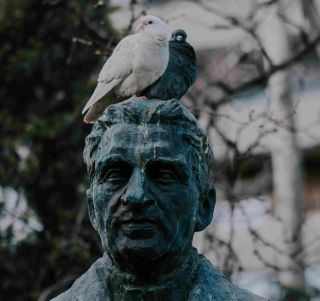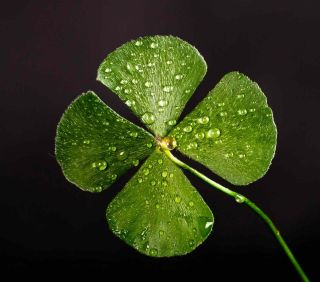Laughter
The Relationship Between Laughter and Luck
Why we sometimes view evidence of both good and bad fortune as amusing.
Posted March 29, 2024 Reviewed by Davia Sills
Key points
- Laughing at minor physical, emotional, cognitive and social failings reestablishes prior status relationships.
- Sometimes, however, ups and downs in life are not due to one's own traits or actions but simply dumb luck.
- A new theory explains why incidents of fortune and misfortune can nevertheless inspire feelings of amusement.
In this blog series, I’ve argued that laughter affirms shared limitations or shortcomings that result from highlighting perceived changes in status relationships—status being a means of measuring our vulnerability. I’ve come to refer to this working model as the Mutual Vulnerability Theory of Laughter.

Laughter comes about in myriad ways. I might inadvertently fumble and drop a cookie, and my momentary lack of coordination—a vulnerability most of us share to some degree—could inspire my brother to laugh sympathetically in a “Don’t feel too badly… I’ve done that on occasion” kind of way (we might call this lifting laughter). Or I might laugh at my own failure in a “Don’t think less of me… you’ve dropped things, too” sort of way (self-lifting laughter). If it had been the last cookie in the package that I promised to my now-peeved brother, he would likely have expressed a “Your selfishness is only exceeded by your clumsiness” motivated laugh (lowering laughter). And if I were to react with such speed and precision as to keep the cookie from actually hitting the floor with just inches to spare, I could utter the laughter of “Yes, that was amazing, but I confess it’s in no way an accurate representation of my true athletic abilities” (self-lowering laughter).
This last scenario brings me to the topic of this post.
The Laughter of Fortune… and Misfortune
There are many ways in which the things we think or do reveal either our forgivable shortcomings or unanticipated strengths. These perceived shifts in status can, in theory, inspire laughter. How, then, can we explain instances where there are no physical, emotional, cognitive, or social shortfalls—or triumphs—at issue but rather simple blind chance at work?

For example, if I’m on a business trip with a coworker and we parked our rental car beneath a tree where a flock of birds roosted overnight, the sight of the car peppered with bird droppings would likely provoke a good laugh. It was dark when we first arrived and nothing to indicate that spot was a favorite of the local wildlife. And it didn’t seriously damage the vehicle. So it was just a touch of poor luck.
Can we claim this to be an example of a vulnerability being highlighted? Was it the result of some shortcoming on our part? Not really. It was just us parking the car in the wrong place at the wrong time. So, does this represent a flaw in the Mutual Vulnerability Theory? I don’t believe so and for two reasons.
The World We Made
Something can be said for the idea that each of us has participated in creating much of the general environment in which we operate. We have participated in society’s construction of roads and parking lots within (and in this example below) otherwise natural bird habitats. Can we really maintain there is no connection between our decisions, collective though they were, and the outcome that inspired our amusement? I don’t think so. We tacitly approved of asphalt there, a parking space here, and so an occasional fecal rainstorm where we’d rather not have it. In that sense, the fault is ours.

We Are Lucky… or Not
Another way to look at this situation, I would argue, is that the attitude in most societies (and, yes, I’m speculating here) is that luck is a trait people possess just as any other, whether it be a physical characteristic or behavioral tendency. More often than not, we think of ourselves and others as not having experienced good or bad luck but rather as being lucky or unlucky, depending on the circumstance. In that sense, we perceive its raising or lowering status just as if it had been due to any other personal trait. So, even if we’re out in the forest camping and just happen to set our tent below a roost tree, we’d accept the mess on the rain fly as if it were our own fault.
Translating instances of good fortune into Mutual Vulnerability Theory parlance:
If it’s my good luck: I could be inspired to express self-lowering laughter so as to suggest to others, “Hey, that was pure chance. I didn’t really have those skills or foresee that outcome, so don’t interpret it as an outcome I can make happen or expect on a regular basis… or perhaps ever again.”
If it’s your good luck: I might offer self-lifting laughter. “That was pure chance, so your status isn’t any higher now than it was a few minutes ago. I can be just as lucky. So we both have the same relative standing as before.”

Translating misfortune into Mutual Vulnerability Theory parlance:
If it’s my bad luck: I might communicate self-lifting laughter. “Hey, that was not my fault, not my limitation… I’m a victim of circumstance!”
If it’s your bad luck (and I am sympathetic): My lifting laughter says, “So sorry that happened, it wasn’t your doing,” and perhaps, “Of course, better you than me…which it certainly could have been.”
If it’s your bad luck (and I’m not sympathetic): My lowering laughter suggests, “Ha! Good. You deserved that. You thought you were better than me, but you’re obviously not.”
In each of these examples, an affirmation of shared vulnerability would help reestablish the prior, preferred status relationship.
A lot of what we experience in life has an element of luck baked in. Games, sports, financial investments, randomly bumping into a good friend or an archenemy… life throws us curveballs from time to time, and we use laughter to help both regain our footing and keep our egos in check.
Two YouTube shorts (among thousands) provide examples where lucky outcomes inspired laughter. Neither was pure luck, of course, but largely so. One laugh was offered by an onlooker and the second by the one bolstered by good fortune.
© John Charles Simon
References
Simon, J. C. (2020). Laughter Redefined. The Israeli Journal of Humor Research 9 (1) 72-83.




